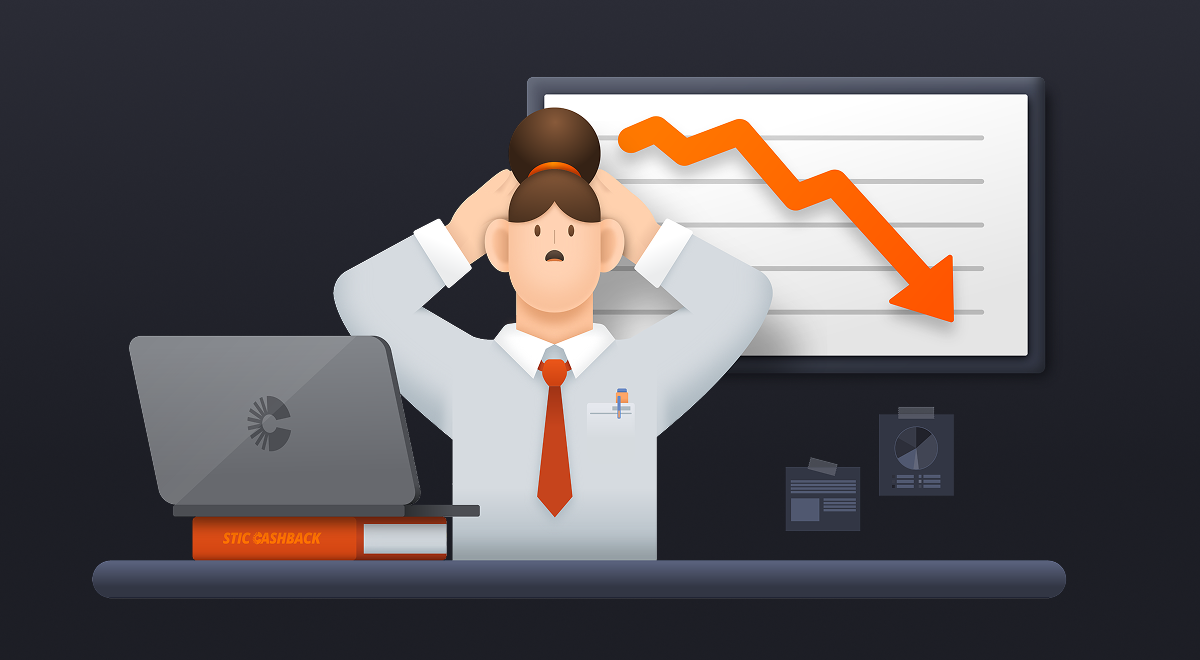Common Trading Mistakes and How to Avoid Them
Jul 16 2025

Some beginner traders are often discouraged by their first failures, but avoiding the most common trading mistakes is easy: find out how!
Entering the world of online trading is an exciting experience, but sometimes the initial difficulties can discourage beginner traders due to mistakes that can actually be easily avoided.
Poor risk management or being too hasty in trying to recover losses can undermine the available capital, but above all, they can erode the trader’s confidence in the success of their activity.
In this article, we will discover some tips that help you avoid common trading mistakes; moreover, we will show how the STIC Cashback programme can serve as a parachute in budget management, helping new traders optimise costs while developing their skills.
Some Common Trading Mistakes for Beginners
One of the most common trading mistakes is overleveraging, which is the use of excessive leverage that can lead to significant losses.
It is well known that leverage in Forex is a mechanism that allows traders to open positions in the market for amounts much larger than their budget. Often, brokers cover part of the trader’s investment, which can translate into a significant gain for the latter with a limited investment.
However, this enticing possibility also carries the risk of incurring equally significant losses, leading to a loss of confidence in less experienced traders. The advice, in this case, is certainly to use leverage commensurate with your level of experience and available budget.
Ultimately, you should not be enchanted by the possibility of suddenly achieving a substantial gain, but rather establish a clear and sustainable strategy that includes seeking small but steady gains, using, for example, leverage limited to a ratio of 10:1 and not higher.
Similarly, it is important to learn proper risk management in trading, adopting measures such as using functions like Stop Loss and Take Profit, which allow exiting the market at the most opportune moment, limiting losses or settling for the gains achieved so far.
Moreover, it is good to remember that proper budget management involves investing only a very small portion of your portfolio for each individual operation.
Online Trading Tips: How to Plan Your Forex Strategies
Regarding online trading tips, it is also important to learn to make choices that are not dictated by the emotion of the moment. On many occasions, in fact, the anxiety to immediately recover a loss, or the greed to achieve a gain in the presence of apparently favourable conditions, can induce the beginner trader to make rash choices, with negative results on their portfolio.
It is fundamental, therefore, to know how to stay composed and above all to invest according to a well-defined strategy in advance, to avoid being overwhelmed by the emotions of the moment and to maintain clarity in making your choices.
Furthermore, one of the most frequent common trading mistakes is acting in market contexts without being properly prepared. The training of the beginner trader and constant updating on the main aspects of trading (such as the best Forex strategies, current trends, available tools, etc.) represent an indispensable aspect in every investor’s baggage, as they allow them to face every situation in a fully-informed way.
One of the best ways to achieve the correct learning of Forex market dynamics is to follow online tutorials on the sites of the best brokers, to learn, for example, to analyse data and trends or to correctly read market charts.
Equally profitable can be practising with a demo account, which does not involve actual loss of money, or choosing to adopt strategies like copy trading for a certain period, which allow you to copy the moves of more experienced traders to understand their tactics.
Avoiding Emotional Trading and Taking Care of Your Training: The Keys to Success in Forex
Prudence, therefore, is one of the qualities that the new trader should never give up, while waiting to acquire the knowledge that will allow them, over time, to undertake increasingly risky operations.
To this end, one of the most recommended practices for new traders is to keep a trading diary to take note of new insights acquired, strategies to be refined, and experiences gained in their daily activity in the Forex markets.
Moreover, exchanging information within a community of traders or with a more experienced mentor can help share insights, receive feedback, and improve your discipline in risk management.
One of the fundamental tips in Forex for beginners is, in any case, to know how to set realistic goals both in quantitative and timing terms. You won’t always, indeed, very rarely, be able to achieve everything immediately, so it’s better to aim for a small but steady return (for example, 5% monthly with respect to the initial budget), within a determined time horizon.
STIC Cashback, the Perfect Ally While You Train for Trading
Finally, it is good to know that in the Forex world, there are many solutions that help beginner traders manage their portfolio better and invest with more confidence, even when they are beginners.
For example, a Forex rebate programme is one of the best ways to save on trading. STIC Cashback is the programme that allows you to obtain weekly rebates, whose amount depends on the volume of operations carried out.
In this way, the net cost of your trading activity decreases, and you can continue to refine your strategies without worrying too much about your budget. The periodic rebates from STIC Cashback offer you the opportunity to rely on an extra income, to reinvest, if you wish, in training courses or premium tools, to make your strategies more effective.
Start applying these Forex tips today and watch your trading skills, and your cashback rewards, grow hand in hand!